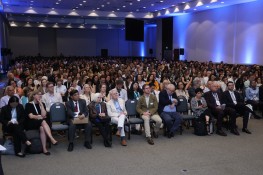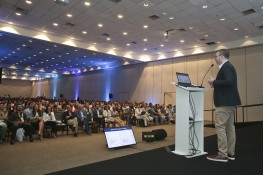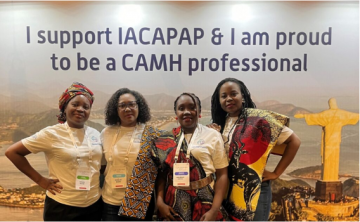IACAPAP President's Message Jun 2024
By Professor Luis Augusto Rohde, Professor, Department of Psychiatry, Federal University of Rio Grande do Sul, Director, ADHD Program, Hospital de Clínicas de Porto Alegre, Brazil
Dear colleagues and friends of IACAPAP,
I would like to focus this column on the World Congress of the International Association for Child and Adolescent Psychiatry and Allied Professions (IACAPAP) which took place in Rio de Janeiro last month. First, I would like to thank all the delegates, who joined us, making it an unforgettable meeting. It was, as expected, the most well-attended IACAPAP Congress ever with around 3000 registrants and 2,272 delegates from 76 countries. These are amazing numbers considering the distance many travelled from all over the globe.
Our scientific agenda, where worldwide leading clinicians and researchers and young professionals presented the most up-to-date data from the field, was truly engaging with 114 symposia, 180 oral communications, 191 poster presentations and 444 poster exhibitions, all reflecting a very diverse portfolio of relevant topics on child and adolescent mental health. We also inaugurated the IACAPAP arena. The arena was a small, welcoming space in the center of the Congress that facilitated conversations about relevant, interesting, and captivating topics and stories from clinical & research on child and adolescent mental health. It was a huge success and was well attended in all sessions.

Congress delegates attended the Opening Ceremony of the IACAPAP Congress 2024 Rio

Keynote session at the IACAPAP Congress 2024 Rio
The city of Rio de Janeiro offered our attendees a stunning landscape and five sunny days! Inside this bulletin, our delegates will find more details and photos to remind them of all the good memories that were made at the Congress, and a chance for those who could not attend the meeting to learn more about this wonderful event with hopes that they join our next congress.
As mentioned in the opening ceremony of the Congress, there is an African saying that you need a village to raise a child. To pull off a successful Congress like this with 2,272 delegates from 76 nationalities you need a village of good people! Thus, we are very grateful for the countless number of people who worked tirelessly to make this Congress a success, with special mention for our committee members, speakers, sponsors, and our gracious host Associação Brasileira de Neurologia e Psiquiatria Infantil e Profissões Afins (ABENEPI). I would also like to take this opportunity to make two special thanks. The first to Professor Guilherme Polanczyk, the president of the IACAPAP’s Congress, who dedicated so much energy, time, and work to make this Congress happen. The second to CCM our professional congress organizer, who worked, as usual, so efficiently and kindly.
We now pass the baton to our good friends Professor Tobias Banaschewski, who will be the President of the next congress in Hamburg, Germany in 2026, and CPO Hanser who is taking the position of the new IACAPAP core organising team, as mentioned in a previous bulletin. The last World Congress of the International Association for Child and Adolescent Psychiatry and Allied Professions in Germany was 20 years ago in Berlin. And up to this past one in Rio, it was the most well attended IACAPAP congress. Thus, we count our IACAPAP community to give their support once again in giving the title back to Germany! The theme of the 2026 Congress will be: “Facing challenges in a constantly changing world: Empowering child and adolescent mental health through evidence-based approaches.” This theme could not be more important and timely, see reasons in the paper discussed at the end of this column.
During this year’s congress, Brazil was experiencing one of the worst climate disasters in its history. An enormous flood in Rio Grande do Sul, which lies in southernmost state of the country, displaced around 650,000 people from their homes. Currently 70,000 people are forced to live in temporary shelters due to the flooding. It’s an enormous humanitarian disaster, and the needs are high. IACAPAP received letters and documents describing horrible situations children are facing due to environmental disasters and wars worldwide. We must ask ourselves, can we as an IACAPAP community do more to help these children and their families? Our last declaration about humanitarian issues was more than 20 years ago. We do have many documents on our website with some guidelines and a chapter in our IACAPAP textbook on how to better serve children and their families during humanitarian emergency. But is this enough? We think it’s not enough. To meet this gap, we are in the early stages of the creation of new initiatives, in partnership with other NGOs, to better respond to these challenges. We are also strongly encouraging our community to take part in the IACAPAP Challenge Grant. The IACAPAP Challenge Grant is aimed at raising funds that will support programs, initiatives, activities, and events organized by IACAPAP. We are particularly dedicated to developing initiatives that provide emotional support for children and their families living in areas affected by natural disasters and war. It was initiated by Professor Myron Belfer, the Honorary President of IACAPAP, who has pledged to match all donations collected for this grant. Visit our webpage at https://www.crowdify.net/en/project/iacapap-challenge-grant/project and help us create initiatives that really matters for these children and their families.
I would also like to update you on the progress made these last three months in the collaboration between IACAPAP and the Stavros Niarchos Foundation (SNF) Global Center for Child and Adolescent Mental Health at the Child Mind Institute:
- SNF Global Center Clinical Fellowship Program for LMICs: The first three candidates from Mozambique—they include a psychiatrist, psychologist, and an occupational therapist—are currently receiving clinical training in Brazil. They were active participants in the Rio Congress. They were also accompanied by Dr. Helena Daniel and Prof. Lidia Gouveia, two psychiatrists from the Mozambique National Health Service. For more info please read the press release here: https://childmind.org/blog/snf-and-iacapap-announces-clinical-fellows/.
- SNF Global Center Child and Adolescent Mental Health (CAMH) Item Bank (for more information on the initiative please see in a previous bulletin): this project aims to provide free, open, multinational, multilingual, and multidimensional tools that accurately assess 17 mental health conditions in children and adolescents worldwide. Those tools will be free and available in multiple languages. They can be used to create specific forms for prevalence estimation, screening, and treatment response. As planned, we have started the consultation with hundreds of clinicians and researchers worldwide to assess cultural relevant and appropriateness. Plans for psychometric assessment and translatability are also underway.

Candidates from Mozambique participated in the SNF Global Clinical Fellowship Program for LMICs
Moving to another topic, as you might remember, the WHO Essential Medicines List (WHO-EML) contains the medications considered to be most effective and safe to meet the most important needs in a health system. The list is frequently used by countries to help develop their own local lists of essential medicines. As of 2016, more than 155 countries have created national lists of essential medicines based on the WHO-EML. Methylphenidate for the treatment of ADHD in children and adolescents is not part of the list despite previous efforts from various groups and associations. The fact that methylphenidate is not part of the list keeps millions of children affected by ADHD without any pharmacological treatment for the disorder worldwide. To attempt to rectify this situation, IACAPAP established a partnership with the World Federation of ADHD to form an international committee to prepare a new appeal to include methylphenidate in the WHO-EML during 2024. We are happy to announce that Professor Molina Brooke and Professor Philip Shaw have agreed to co-lead this initiative. They have invited a diverse group of members from different countries, all without any conflict of interest, who will work on this document. The work will be developed independently of any influence of IACAPAP and WFADHD, and the document produced is expected to be endorsed by both associations to send to WHO next December.
As you might remember, our ante-penultimate paragraph is always dedicated to calling your attention to an impactful paper recently published on CAMH in scientific literature. In this column, I would like to highlight a paper published in JAMA this year: (Upadhyay RP, Taneja S, Chowdhury R, Dhabhai N, Sapra S, Mazumder S, Sharma S, Tomlinson M, Dua T, Chellani H, Dewan R, Mittal P, Bhan MK, Bhandari N; Women and Infants Integrated Interventions for Growth Study (WINGS) Group. Child Neurodevelopment After Multidomain Interventions From Preconception Through Early Childhood: The WINGS Randomized Clinical Trial. JAMA. 2024 Jan 2;331(1):28-37. doi: 10.1001/jama.2023.23727). The authors report on neurodevelopmental outcomes related to the Wings protocol, enrolling 13500 individuals in a randomized trial involving low- and middle-income neighborhoods in Delhi, India. The participants were allocated to four arms: preconception, pregnancy, and early childhood interventions. (A) preconception interventions only, (B) pregnancy and early childhood interventions only, (C) no preconception interventions, and routine pregnancy and early childhood care (D). The package of interventions included a very robust set of health, nutrition, psychosocial care and support, and WASH (water, hygiene and sanitation) interventions. The findings regarding socio-emotional development for babies at 24 months were modest for all three interventions compared to routine treatment, despite the robustness of the interventions. Why this paper is so relevant? We have been emphasizing, as CAMH professionals, the importance of the early development period for the adequate development of individuals. This gives the sense that anything done at this period to ameliorate socio-emotional development would be extremely beneficial. The story told here does not support this belief, calling our attention to why well-designed investigations in the field are so needed. Back to the beginning of this column, this was another reason why IACAPAP and our German colleagues selected, “Facing challenges in a constantly changing world: Empowering child and adolescent mental health by evidence-based approaches,” as the theme of our next congress.
Finally, regarding the auditable goals proposed in the previous bulletin, they were partially achieved, since:
- We have the first team from Mozambique already in training as part of the SNF Global Center Child and Adolescent Mental Health Clinical Fellowship Program and have the next host country defined (South Africa). The definition of the African partner country (the one who will send the fellows) is being finalized;
- The congress in Rio was a great success;
- The IACAPAP committee for a new appeal for WHO-EML to include methylphenidate in their essential list of medications is formed and working; and,
- The cultural assessment of the SNF Global Center Child and Adolescent Mental Health (CAMH) Item Bank to evaluate CAMH worldwide is moving forward at full speed now.
The auditable goals up to the next bulletin will be:
- Achieve our threshold for the IACAPAP Challenge Grant. For this, we will need your support!
- Finalize the definition of the African partner country (the one who will send the fellows) as part of the SNF Global Center Child and Adolescent Mental Health Clinical Fellowship Program. Present preliminary results from the cultural assessment of the SNF Global Center Child and Adolescent Mental Health (CAMH) Item Bank.
I hope you all enjoy reading our Bulletin.


